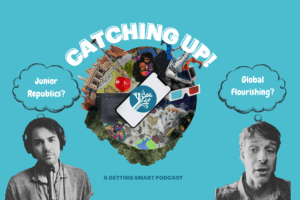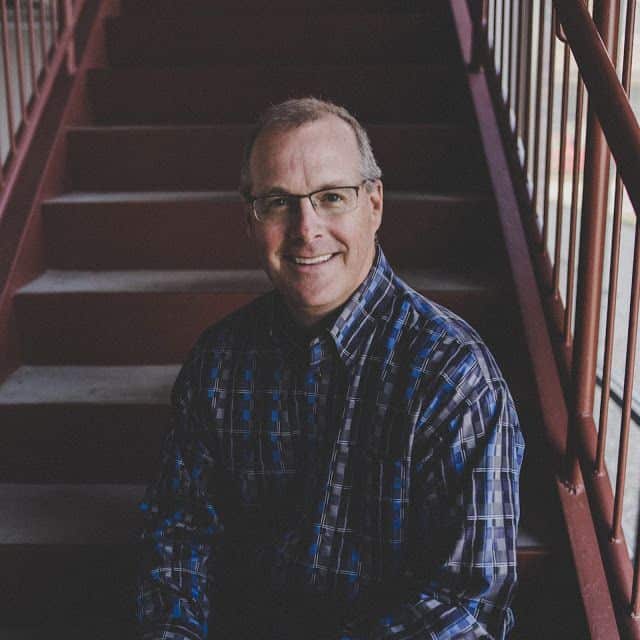Q. Please introduce yourself.
Hi, I’m Trace Pickering, I’m a lifelong resident of the state of Iowa. I’ve been in education and entrepreneurship for most of my career but bopped in and out a few times to do some entrepreneurial work. I just handed over the reins to Iowa BIG, I was previously the Executive Director and now I’m a Senior Fellow for Getting Smart.
Q. What is Iowa BIG?
A. Iowa BIG is a learner-centered program with 2 school districts where kids have the opportunity to learn academic core academic standards through authentic projects in community.
Q. It seems like a really interesting example of pathways. What do pathways mean to you?
A. To me, pathways means just what it says: there’s no one best way forward for any individual person. We all have to choose our own paths and education should mirror that. There should be opportunities for people within our educational system, no matter what it is they aspire to, they can use to get themselves where they want to go.
Q. Is it truly realistic to give students the option to make those choices for themselves?
A. Absolutely. I think we’ve just been tied down for hundred-some years with the idea that the factory model is the best or the only way. If we just keep trying to make the old way better it clearly doesn’t provide pathways. Almost every other aspect of our lives have all kinds of pathways to them … so there’s no reason why we can’t do it in education. In fact, many people are already doing it.
Q. When did you first realize that pathways were important?
A. I wouldn’t have been able to articulate it, but I think through my own high school experience and college experience. I spent time just observing students in my schools who won and who lost for various reasons, and it didn’t make sense to me. My friends and I took on challenges for the kind of things we cared about which was different when I got into education. I could just see the light go out of so many kids’ eyes because what the school was talking about didn’t connect to their life. They couldn’t see themselves in it. They just flat didn’t care about it and it became apparent that there needs to be a lot of different ways for people to get to it.
Ironically we do it outside of school. As soon as the bell rings at 3:30 we have all kinds of pathways for kids they can go. They can play in the band, be in the choir, be in sports… we offer all these different pathways but during the school day most kids are tracked down the same steps. It’s always kind of absurd to me.
Q. I’ve never heard that framing before… what we do after school not as extracurriculars but as pathways. When you use that framing: how does that help more kids win than lose?
A. I think explaining it that way has really helped lots of people I’ve talked to understand it. You know, where do you see kids as passionate and excited, where do you know they’re all in? It’s always at 3:30… why aren’t we doing that from 8 to 3? Why do they have to wait?
That’s helped pathways resonate for people. Then they begin to see that if you just think about your own life, the things that get you going, it’s your own unique pathway, right? The school probably couldn’t possibly predict what it is it was going to make you tick, so we have to provide options to let you figure that out and then support you in whatever those pathways are.
Q. So what advice do you have for people who might want to start pathways?
A. I think the hardest thing to do but the most important thing is to shift your paradigm away from this idea that “everything that we teach is critically important because it was important to me.” I taught English and History, of course, I think everybody should love English and History and be as passionate about it as I am, but the reality is that’s not the case. So that’s number one: getting over yourself about how important your content is. Just start focusing on the kids in front of you and figuring out what makes them tick.
I think it’s just getting started there. If you’re a leader of a system or organization, How do you just start to create more options for kids to meet standards in more ways? Ways in which they can express their interests in their own curiosities during the school day.
Q. When you really started to dig into pathways was there anything that you had to rethink about education?
A. Yeah, I think along with my colleagues in Iowa BIG we’ve we had conversations for several years about the positive and negative consequences of the standards movement. I think we’ve just gone too far. There are so many standards that it really locks people down. Over the years we’ve really pivoted towards “yes, there are things that everybody really needs to know, but let’s get really clear about what they are.”
I really don’t know what any particular student is going to need to know in the future. You want to approach it from that kind of humble place. Then you begin to realize that the game as an English teacher is to get people to enjoy reading. See the value in it. It’s not to love Ralph Waldo Emerson like I do, right?
So one thing I often say is we need to stand with kids against the standards. I think too often schools stand with the standards against the kids.
Q. Last question: if you were to have a walkout song, what would it be?
A. Probably Break on Through by The Doors. Well, I’m a big Doors fan but I think the idea break on through to the other side. That’s what we need to do in education. We’ve got to break on through this monolithic system into a system that has multiple pathways that work for everyone.



